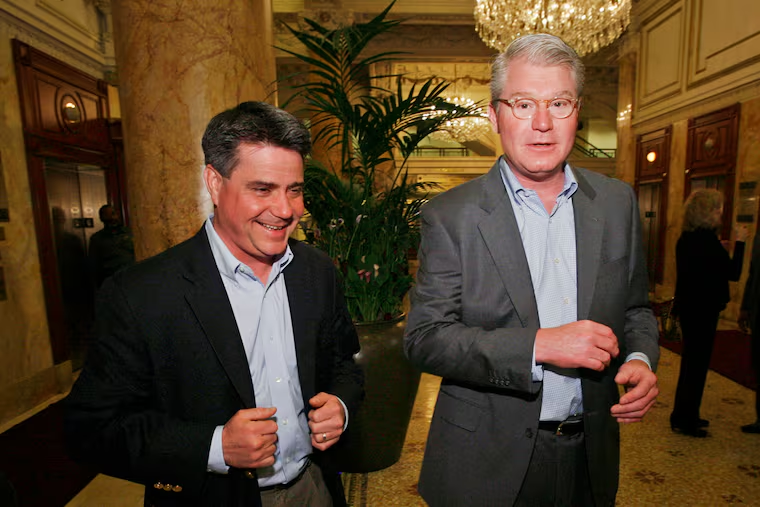What’s next for labor leader John Dougherty and City Councilmember Bobby Henon after bribery trial convictions
Will they go to prison? Will they have to resign? What happens now that a jury has convicted labor leader John Dougherty and Philadelphia City Councilmember Bobby Henon?

A federal jury convicted labor leader John Dougherty and Philadelphia City Councilmember Bobby Henon on most charges in their bribery trial, a verdict that is certain to upend the landscape of politics and organized labor in the city.
But what comes next for the man who has led Local 98 of the International Brotherhood of Electrical Workers for nearly three decades and the union electrician propelled into a Council seat on a tide of union money and support?
Here’s what you need to know:
Are they going to prison?
The most serious count on which both men were convicted carries a maximum prison term of 20 years in prison.
U.S. District Judge Jeffrey L. Schmehl has set sentencing dates for Feb. 22 for Henon and Feb. 23 for Dougherty, and both men will remain free on bond until that day. Over the next several months, lawyers for both sides will file briefs with the court laying out what they believe an appropriate sentence should be.
In imposing sentences, federal judges are guided, but not bound, by sentencing guidelines that seek to standardize punishment across similar cases using criteria like a defendant’s past criminal history, whether they played a leadership role in the crime, and various aspects of their personal background and the nature of their illegal conduct. While most judges stay within the sentencing range recommended by the guidelines, they have the freedom to vary from it.
Can they appeal?
Dougherty and his lawyers vowed even before the trial began to appeal the verdict if they lost. And they believe they have a strong case to make.
Throughout the trial, they have argued that the government’s theory of the case does not satisfy the current requirements for a conviction under federal bribery statutes.
For instance, they maintain, many of the things Henon was accused of doing for Dougherty — including setting up meetings and making phone calls to various government agencies on his behalf — were specifically cited by the Supreme Court in a 2016 case as not being enough to sustain a conviction.
» READ MORE: The McDonnell ruling: All you need to know about the case that upended the legal landscape for political corruption
They’ve raised that issue twice before Schmehl — once pretrial and at another point during the proceedings. Both time’s he’s rejected their arguments, agreeing with prosecutors that their case was strong enough to let the jury decide it.
What does this mean for their jobs?
For Dougherty, the conviction means he’ll be required to resign as business manager of Local 98, opening up a vacuum at the top of one of the city’s most powerful unions after nearly three decades of his consistent leadership.
Federal law bars those convicted of certain crimes — including bribery — from holding leadership positions or employment in labor unions.
» READ MORE: Catching up on the John Dougherty and Bobby Henon Trial
Henon, meanwhile, will be required to resign his seat on Council as state law bars people convicted of felonies from holding public office. But he won’t be required to do so until the time of his sentencing. He can continue to collect his roughly $140,0000-a-year city salary until then.
Because Henon’s crimes are tied to his public role, he is also likely to lose his city pension.
What will happen to his role as a Democratic ward leader in Northeast Philadelphia is less certain. The Democratic City Committee’s bylaws don’t specifically prohibit those convicted of felony crimes from holding the office. And should he stay on, he could play a large role in choosing his successor on Council.
Once Henon resigns, the Democratic and Republican city committees will each select the nominees who will run to replace him in a special election. Under their rules, the ward leaders from Henon’s Northeast Philadelphia Council district, including Henon should he hold onto the post, will select the nominee.
For Dougherty, more trials loom
This is only the start of Dougherty’s legal troubles. He still faces two more federal trials in the coming months — the first on accusations that he and five other Local 98 officials embezzled more than $600,000 from their union to cover home repairs, shopping sprees, travel, and dozens of mundane purchases for items like diapers and cereal. The second is tied to threats prosecutors say he made to a union contractor who employed his nephew.
Schmehl has not set dates for either of those trials, but he is likely to want to move on the embezzlement case first since it’s the oldest, involves more defendants, and has been delayed several times by the pandemic.
» READ MORE: Labor leader John Dougherty still has more legal problems
Meanwhile, Dougherty’s union is still fighting the U.S. Department of Labor in a separate case that seeks to force Local 98 to redo its most recent leadership elections due to allegations that labor leader and his allies improperly sought to intimidate those who wished to challenge them for their posts.
It’s also not the last time that City Hall’s business will be dragged into federal court. Henon’s fellow councilmember, Kenyatta Johnson, faces his own bribery trial tied to allegations he accepted more than $66,750 in bribes paid in the form of contracting work for his wife from a Philadelphia nonprofit seeking his help in matters before Council.
That trial is scheduled to begin in February.